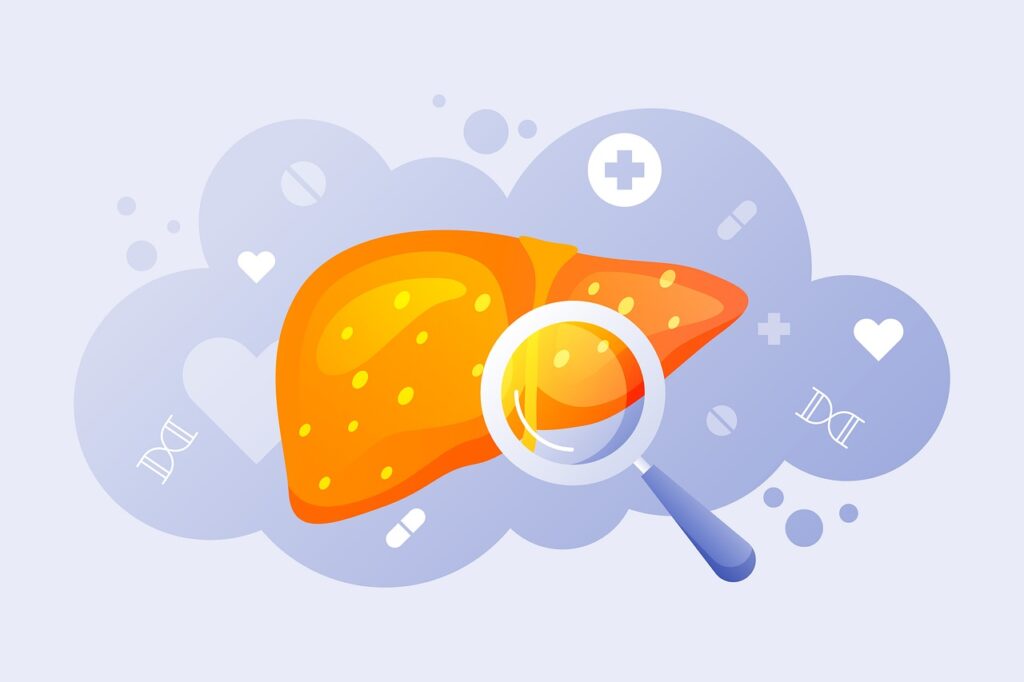Contact Us: (901) 675-6125

Fatty liver disease is a metabolic disorder defined as an accumulation of fat in the liver cells (triglycerides and other fats). There are several causes of fatty liver disease, and one of the underlying causes is obesity or being overweight. There is not a cure for the disease but reversing this disorder can be achieved by making lifestyle changes such as weight loss and decreasing or stopping alcohol use. In this blog, we will explore the relationship between fatty liver disease and weight loss and provide valuable insights and practical tips on how to improve fatty liver through weight loss.
The liver is the largest solid organ in the body. It is the only organ that can regenerate or regrow if damaged or partially removed (at least 25% of the liver is needed for this process). The liver has hundreds of functions. Some functions the liver helps with are production of chemicals for digestion, fat metabolization, immunological function, detoxification, and protein synthesis. Fatty liver can be classified as alcoholic fatty liver disease (AFLD) and nonalcoholic fatty liver disease (NAFLD).
Another common name for fatty liver disease is hepatic steatosis. Symptoms for the disease are usually unnoticed but tiredness/fatigue and upper right-sided abdominal pain or discomfort may be common for both types, AFLD and NAFLD. Fatty liver disease can progress through stages:
- Simple fatty liver – excessive fat in the liver (usually harmless)
- Steatohepatitis – fat and inflammation in the liver
- Fibrosis – persistent inflammation that has caused scarring, but general function may be normal.
- Cirrhosis – widespread liver scarring and function is compromised, a severe stage that is irreversible.
Increased body weight, especially around the abdomen, is an important risk for the development and progression of fatty liver disease. Simply put, excess fat will deposit in adipose tissue as well the liver. This influx of fat cells in the liver leads to fatty liver disease, and if not reversed, progression through the above-mentioned disease stages can occur.
As mentioned, fatty liver is a disease most often caused by lifestyle choices. Therefore, beginning to change certain lifestyle choices can reduce or significantly improve the disease. Among the lifestyle changes to make is losing weight. Weight loss can be a cornerstone in the management and treatment of fatty liver disease. Getting rid of excess pounds can help to reduce the amount of fat in the liver, alleviate inflammation and improve liver function. This weight reduction can additionally improve your metabolic health status by decreasing insulin resistance which is another common happening of fatty liver disease.
Practical tips for weight loss and decreasing fatty liver include:
- Adopt a balanced diet to include whole foods such fruits, vegetables, lean proteins, and whole grains. Limit processed foods, sugary beverages, and saturated fats.
- Control portion sizes and be mindful not to overeat. Use smaller plates to help with portion control.
- Regular physical activity engagement. Participate in aerobic exercise such as walking, jogging, or cycling. Include strength training exercises to build muscle and additionally boost metabolism.
- Hydrate well. Drink plenty of water throughout the day to support overall health and assist in weight loss.
- Limit alcohol intake as much as possible. Reduce or eliminate alcohol consumption to prevent the chances of developing liver inflammation.
- Consult with a healthcare professional to obtain guidance, personalized advice, and monitoring on weight loss.
To conclude, fatty liver disease is a reversible condition. Even though there are several causes, weight loss plays an important role in managing the severity of the disease. By adopting a healthy lifestyle that includes a balanced diet, regular exercise, and other positive habits, you can not only achieve sustainable weight loss but also improve liver health. Please remember, weight loss is a gradual process that should focus on long-term changes to promote overall well-being. And don’t forget to always consult a healthcare professional for weight loss advice tailored to your specific needs.
